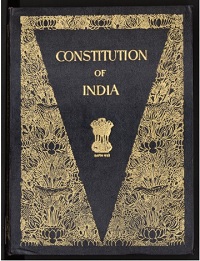Indian Polity and Constitution GK MCQs
Overview:
| Questions and Answers Type: | MCQs (Multiple Choice Questions). |
| Main Topic: | General Knowledge. |
| Sub-topic: | Indian Polity and Constitution. |
| Number of Questions: | 5 MCQs. |

Indian Polity and Constitution MCQs (Multiple Choice Questions) with answers for various state exams and UPSC civil services, SSC, banking, MPSC, UPPSC, MPPSC etc. Exams. Learn and prepare Objective type Questions on Indian Polity and Constitution.
1. The Dhar Commission is related to
- Civil services.
- Famine and drought.
- State formation.
- Education.
Answer: (c) State formation.
Solution: The Dhar Commission is a Linguistic Provinces Commission formed in June 1948. Its Chairman was S.K. Dhar. Its objective is to find possibilities to reorganize the states on a linguistic basis.
Solution: The Dhar Commission is a Linguistic Provinces Commission formed in June 1948. Its Chairman was S.K. Dhar. Its objective is to find possibilities to reorganize the states on a linguistic basis.
2. The citizenship of India is acquired by
- Naturalization.
- Alteration.
- Approval of Panchayat.
- Deprivation.
Answer: (a) Naturalization.
Solution: Under the Indian Constitution Citizenship of India can be acquired by birth, naturalization, incorporation of territory, decent, and registration.
Solution: Under the Indian Constitution Citizenship of India can be acquired by birth, naturalization, incorporation of territory, decent, and registration.
3. The term law does not include
- Duties.
- Rules.
- Delegated legislation.
- Ordinance.
Answer: (a) Duties.
Solution: In the Constitution Article 13 deals with the law. The term "Law" includes ordinances, orders, bye-laws, rules, regulations, notifications, and customs laws.
Solution: In the Constitution Article 13 deals with the law. The term "Law" includes ordinances, orders, bye-laws, rules, regulations, notifications, and customs laws.
4. Which of the following is the criticism of Fundamental Rights?
- Dignity and respect of individual.
- Foundation stone of social equality and justice.
- Preventive detention.
- The bedrock of the democratic system
Answer: (c) Preventive detention.
Solution: The criticisms of Fundamental rights are Excessive limitation, No social and economic rights, no permanency, suspension during emergencies, expensive remedies, preventive decision, etc.
Solution: The criticisms of Fundamental rights are Excessive limitation, No social and economic rights, no permanency, suspension during emergencies, expensive remedies, preventive decision, etc.
5. Which one of the following rights is not applicable to foreign nationals?
- Right against Discrimination.
- Equality before law.
- Prohibition of trafficking.
- Right against arrest and detention.
Answer: (a) Right against Discrimination.
Solution: The rights which are not applicable to foreign nationals are the right against discrimination, the right to equality in public employment, the right to freedom, the right to vote and contest elections, the right to establish and administer educational institutions, etc.
Solution: The rights which are not applicable to foreign nationals are the right against discrimination, the right to equality in public employment, the right to freedom, the right to vote and contest elections, the right to establish and administer educational institutions, etc.
General Knowledge Questions
Indian Polity and Constitution
Indian Polity and Constitution GK MCQs-1
Indian Polity and Constitution GK MCQs-2
Indian Polity and Constitution GK MCQs-3
Indian Polity and Constitution GK MCQs-4
Indian Polity and Constitution GK MCQs-5
Indian Polity and Constitution GK MCQs-6
Indian Polity and Constitution GK MCQs-7
Indian Polity and Constitution GK MCQs-8
Indian Polity and Constitution GK MCQs-9
Indian Polity and Constitution GK MCQs-10
Indian Polity and Constitution GK MCQs-11
Indian Polity and Constitution GK MCQs-12
Indian Polity and Constitution GK MCQs-13
Indian Polity and Constitution GK MCQs-14
Indian Polity and Constitution GK MCQs-15
Indian Polity and Constitution GK MCQs-16
Related Topics
Basic General Knowledge
Biology
Books and Authors
Chemistry
Famous Places
Indian Famous Personalities
Important Dates and Days
Indian Art & Culture
Indian Economy
Indian Environment and Biodiversity
Indian Geography
Indian Ancient History
Indian Medieval History
Indian Modern History
Indian Polity and Constitution
Indian Organizations
International Organizations
Physics
Physical Geography
Sports
World Geography